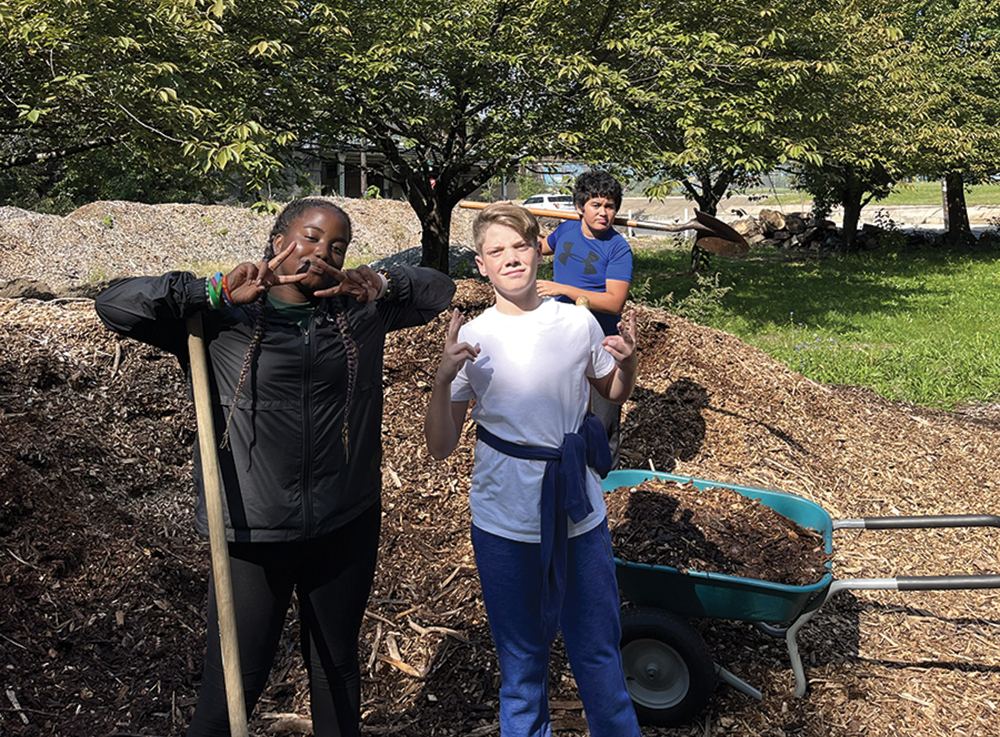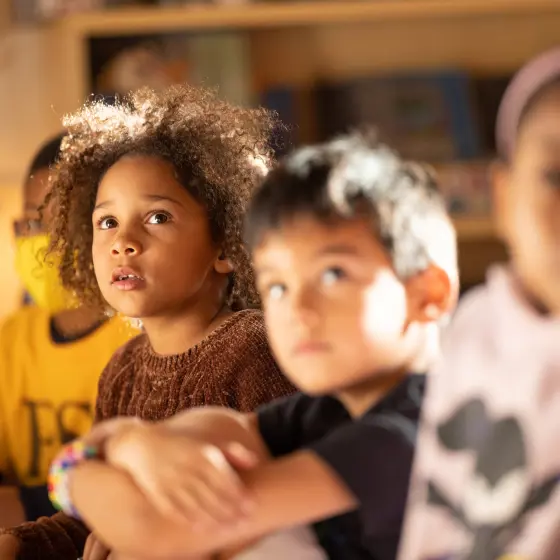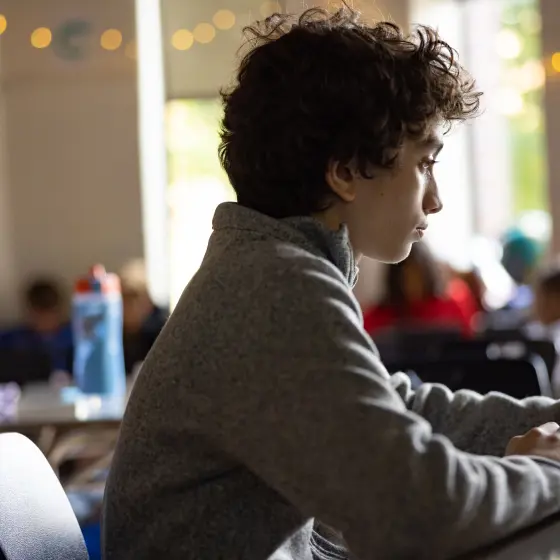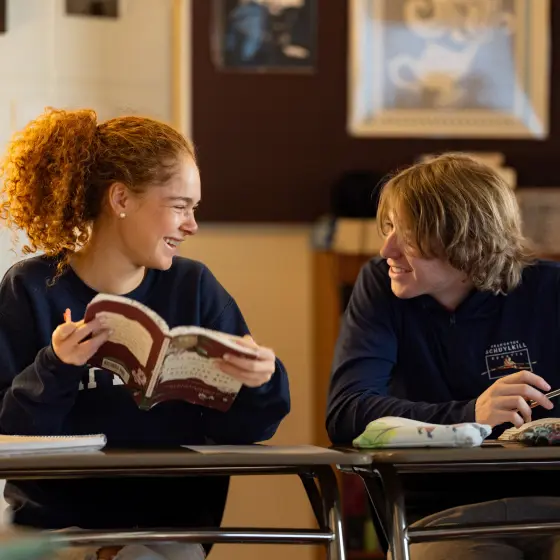Integrating Green Spaces Into Our Educational Curriculum
Urban educational institutions can effectively integrate green spaces into their curriculum. |
Friends Select exemplifies how urban educational institutions can effectively integrate green spaces into their curriculum. |
Sister Cities Park
Encouraging Creative Play and Exploration
Conveniently located just one block from the Parkway Building, Sister Cities Park serves as a favorite destination for students across grade levels. For the youngest learners in pre-kindergarten, the park is the initial destination to practice walking safely in the city and to conduct interviews with the Center City District staff who manage the park. Representatives from the park’s design firm have interacted with students, answering questions about the park’s distinctive features such as the fountain and Children’s Discovery Garden.
Unlike traditional playgrounds, which are often designed for specific activities, natural spaces encourage creative play and exploration; when students visit Sister Cities Park, they have the freedom to direct their own play. “When children are in natural spaces, the play can change every time; sometimes the rocks at Sister Cities are a pirate ship, other times a castle. Students can spend half an hour dropping leaves in the water feature and trying to figure out why one moves faster than another. They teach one another how to successfully climb to the top. It gives them ownership over their play,” said pre-K teacher Kellie Bowker P’14, ’17. “We know, both from research and our lived experience, that there are so many benefits to time in nature: it reduces stress, increases creativity, builds confidence, increases cooperation, and gives us a variety of sensory inputs.”
Fairmount Water Works
Fostering Environmental Stewardship
Outdoor education also fosters environmental stewardship, allowing students to learn firsthand about the challenges facing urban environments, such as pollution and habitat loss, and how to contribute to solutions. Fairmount Water Works is a crucial educational site for Friends Select students. Located on the banks of the Schuylkill River, this historic landmark offers a unique setting to study environmental science and urban planning. Students explore water filtration, conservation, and the history of Philadelphia’s water supply through interactive exhibits and hands-on activities, making it an engaging learning environment.
Middle school science teacher Carolyn Gray-Rupp P’38 and her fifth grade class visit the Water Works in their exploration of “Science of the City,” focusing on Philadelphia’s urban ecosystem and the Delaware River Basin watersheds. Carolyn recently received a City Curriculum grant to support her educational programming at the site. “Due to Hurricane Ida’s storm damage and the COVID-19 pandemic, we hadn’t been able to visit the Water Works for some time. However, the grant allowed me to redesign the unit and plan future visits,” Carolyn explained. “As a school in the city and of the city, these grants provide vital resources for teachers to step back and think big picture about their program outside of the daily demands of the school year. I am grateful for the opportunity to tap into my creativity with this funding to enrich our learning with site visits and expert knowledge during the school year.”
Laurel Hill Cemetery
Rethinking the Past as Present
With designations on the National Register of Historic Places, and the National Recreation Trails System, and as the first cemetery to be honored as a National Historic Landmark, Laurel Hill East Cemetery provides a unique educational opportunity for FSS students. An active burial ground, Laurel Hill also provides open, green, public spaces for recreation and is rich in both history and biodiversity. Students visit to explore the cemetery’s diverse flora and fauna, as well as its historical monuments, gaining insights into Victorian-era customs and the cultural significance of memorial landscapes.
Suzanne Morrison, upper school English teacher, integrates visits to the cemetery into her course “Monstrous Imaginings: The Unmaking of Humanity.” Through selected texts and lively discussions, students explore how otherworldly beings challenge and reshape one’s understanding of morality, hope, faith, and knowledge. “In the fall of 2023 and again this September, a veteran Laurel Hill tour guide brought history to life through the fascinating stories in her ‘Spiritualism’ tour,” said Suzanne. “She and I had several conversations before our tours, so they were tailored to our content and questions. Students were reading Frankenstein at the time, which was written in the early 1800s, and much of her talk focused on that century’s collision between religion and science. Her tour was perfect in adding to the historical trajectory of the curriculum.”
Urban Creators
Providing Agricultural Service Learning Opportunities
Philadelphia’s parks and green spaces are integral settings for Friends Select’s service activities. Urban Creators, a youth-led organization that transforms vacant lots into urban farms, plays a crucial role in these endeavors. Students engage in hands-on experience in soil health, plant cultivation, and community-supported agriculture. This involvement not only teaches important ecological principles but also fosters a sense of social responsibility and community engagement. “During service learning at Urban Creators, middle school students are able to experience urban land use and learn about a non-traditional approach to farming. Both are good to broaden perspectives on what’s possible,” said middle school music teacher Dan Capecchi, who visits the site with middle school service learning groups. “These activities speak to stewardship pretty clearly—taking care of what is around us as best we can—which can sometimes be overwhelming in an urban environment.”
Friends Select exemplifies how urban educational institutions can effectively integrate green spaces into their curriculum. By utilizing Philadelphia’s rich array of parks, gardens, and historical sites, the school provides students with invaluable opportunities to connect with nature, understand environmental issues, and develop as informed, responsible citizens. “As an institution with a goal to educate lifelong learners, students must have learning opportunities outside of the classroom. Stewardship and care for the environment start at home, and here at FSS. In our classes, when we teach about sustainability, we highlight examples of this testimony and hope to inspire students to make more sustainable choices in their own lives,” Carolyn said. “As a school with an urban footprint, I think students truly appreciate opportunities to be outdoors in natural spaces. We are fortunate that resources are being invested in the care and restoration of green spaces in our city, which makes it an exciting time to live in Philadelphia.”
Where Next?





